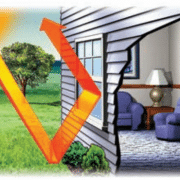Improving the Thermal Insulation of your Home
A home with good thermal insulation can save up to 30% of energy, which has direct effects both in the electric bill and in the CO2 emissions to the environment. What precautions should we take to improve the thermal performance of our home? Here are some tips:
The thermal insulation of a dwelling is the capacity that it has to retain heat (in winter) or cold (in summer), which we basically generate through heating and/or cooling systems. No matter how much we invest in a good air conditioner or a good heating system, it will do little good if the house is not well insulated.
But not only because of energy saving or environmental awareness, but also because, in less than a year – as of January 1, 2013 – the Royal Decree of Energy Efficiency of Existing Buildings announced that it will require all homes that are bought, sold or rented in Spain have a certificate that guarantees their energy performance.
In this way, the homes will have a distinctive efficiency similar to that already have the appliances, which will also affect the sale or rental price of the same. In fact, housing will be classified by a series of letters, ranging from ‘A’ (maximum efficiency) to ‘G’ (lowest energy efficiency).
Let’s see what are some aspects you can take into account to improve, without major investments, the thermal insulation of our home:
In a home, heat loss occurs through windows, doors, floors, walls and ceilings. In the case of windows and doors to the outside, it is very important to check that there are no leaks of energy and, if they do, take the appropriate measures. In floors, walls or ceilings it’s essential to have good installation with effective products and high thermal resistance. If the house is older, there is a wide variety of materials that allow thermal insulation of a wall, a floor or a roof to be reinforced.
The windows are one of the weaknesses of the house. To minimize their leaks of heat or cold it is advisable that they have double pains and, if possible, an air chamber. It will also improve their thermal insulation capacity if they have a quality carpentry (PVC, for example) which prevents the formation of thermal bridges, as well as having a specific glass to reduce heat losses.
In summer it is highly recommended to use awnings and blinds to minimize overheating your house.
In winter, however, we must take full advantage of the sunlight and let it in through the windows by leaving curtains open.
Finally, it is essential to ventilate the house well in the morning and at night. Ten minutes is enough to renew the air of a room.






